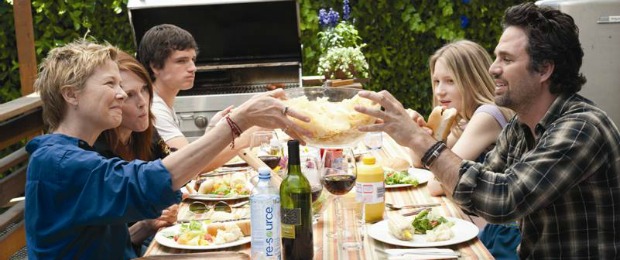The Kids Are All Right
Two major Hollywood leads playing a long-term gay couple, dealing with the sort of problems that many long-term couples have to face. For that, The Kids Are All Right deserves to be applauded.
Plot summary
Two children conceived by artificial insemination bring their father into their family life.

Nic and Jules (Annette Bening and Julianne Moore) are a middle-aged, long-term lesbian couple in California with two teenage children conceived through artificial insemination. Both children – Joni, 18, and Laser, 15 – share the same paternal DNA, but were born separately to their two mums. As Joni approaches the age of 18, she is legally entitled to enquire who her biological dad is, which she is pressed to do by younger brother Laser, who is curious about the missing father figure in his life. Unbeknown to their mothers, the teenagers track down their biological sperm donor, Paul (Mark Ruffalo); the laid-back owner of a hippyish, organic fare restaurant and bar. They are immediately charmed by his easy-going manner, which is in strict contrast to breadwinning mother Nic (Bening), a high-flying doctor. Jules (Moore) is the more directionless of the pair, and is embroiled in launching a business as a landscape gardener; her umpteenth attempt to forge her own successful career.
Soon enough, the two women realise that their kids are hiding something from them, and Mark comes crashing into their family life. Everyone tries to adapt to accommodate him, but it’s the kids who do so more successfully. Nic is territorial and protective of her existent family unit, while Jules… well, Jules finds herself confused by her feelings for the swarthy new arrival.
Following its screening at the Sundance Film Festival at the beginning of the year, The Kids Are All Right is one of 2010’s more eagerly-awaited films by gay audiences. Director and co-screenwriter Lisa Cholodenko had fashioned a thoroughly contemporary, part-comic, bittersweet family-centred drama. It may be based around a thoroughly contemporary dilemma, but its themes are pretty universal; the tension between adults and their offspring when the kids assert their own independence, the difficulties inherent in maintaining long-term relationships, and how the relationships within families change and evolve over time. In fact, there are a whole host of ‘issues’ covered in this film, not least of all involving sexuality, and Cholodenko and fellow screenwriter Stuart Blumberg wisely strive to keep the tone light and sprightly to avoid things becoming too bogged down in polemic. How far they succeed is a matter of personal judgement. I ended up sneaking glances at my watch in the second half, but my companion thought the whole concoction delightful. It does, eventually, build to a satisfyingly moving ending, helped enormously by vanity-free and typically luminescent performances from both Moore and – in particular – Benning, who are wholly believable as Nic and Jules. Ruffalo too adequately fulfills his role as the handsome Mark – a man who finds himself questioning his lifelong avoidance of commitment.
Although the pace ebbs and flows, and the comedy can be at best described as ‘gentle’, what remains refreshing is viewing two major Hollywood leads playing a long-term gay couple, dealing with the sort of problems that many long-term couples have to face. For that, The Kids Are All Right deserves to be applauded.











COMMENTS